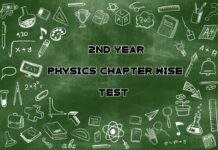M.A Philosophy Syllabus Part II of 2021.
Introduction
Table of Contents
The following Syllabus and Courses of Reading for M.A. Philosophy (External Students) were approved by the Board of Studies in Philosophy. The Detail syllabus of M.A Philosophy Syllabus Part II of 2021 is given below;
M.A Philosophy Syllabus Part II
List Of Part II Subjects
- Paper I MODERN PHILOSOPHICAL MOVEMENTS
- Paper II MULSIM THOUGHT IN SOUTH ASIA OR PHILOSOPHY OF RELIGION
- Paper III MODERN METAPHYSICS OR PHILOSOPHY OF MIND OR PHILOSOPHY OF EDUCATION
- Paper IV PHILOSOPHY OF LAW OR PHILOSOPHY OF ART OR INDIAN PHILOSOPHY
- Paper V THESIS OR ESSAY
Paper I
MODERN PHILOSOPHICAL MOVEMENTS
1. Logical Positivism:
Turning Point Philosophy, Elimination of Metaphysics Through Logical Analysis of Language, Criterion of Verifiability
2. Dialectical Materialism:
Matter, Dialectics, Historical Materialsim Theory of Knowledge.
3. Existentialism:
Husserl’s Phenomenological Method, Man in the World, Man and Fellow Man, Man and God, Death (with special reference to Kierkegaard, Heidegger, Sartre).
4. Conceptual Analysis:
Word-meaning, Sentence-meaning, Vagueness, Private Ordinary Language.
Paper II (Opt I)
MUSLIM THOUGHT IN SOUTH ASIA
Introduction:
Islam in the Indian Environment: A Brief Survey of Mutual Interaction especially in the Fields of Mysticism and Metaphysical Thought.
1. Sheikh Ahmad Sirhindi:
i) Metaphysics. (ii) Kalam.
2. Shah Wali Allah:
i) Metaphysics.
- (a) Concept of God.
- (b) Cosmology.
- (c) Unity of Being.
(ii) Mysticism. (iii) Ethics. (iv) Social and Economic Ideas. (v) Philosophy of History.
3. Sir Syed Ahmad Khan:
i) Socio Political back-ground of his ‘Thought. (ii) Significance and Importance of his Revivalism. (iii) Nature as the Overriding principle of his Thought : God, Miracles, Prayer, Prophetic Consciousness.( iv) political , Educational, and Moral views.
4. Iqbal:
(i) Religious Experience: Nature, Characteristics and the Principle of its Verification, Difference between Mystic and Prophetic Forms of Consciousness. (ii) Concept of Ultimate Reality and Its Relationship with the Phenomenal World. (iii) Concept of Ego, its Origination, Development, and Destiny. (iv) Ijtihad: The Principle of Movement in the Structure of Islam.
Paper II (Opt. II)
PHILOSOPHY OF RELIGION
- What is philosophy of religion?
- Arguments for the Existence of God
- Divine Attributes: Eternity and Changeless, Omnipotence,Omniscience.
- Modern Challenges to Religious Relief (Psychoanalysis, Logical Positivism, Marxism)
- Faith and Reason
- Nature and Function of Religious Language.
- Religious Experience
- Problem of Evil
- Life after Death.
Paper III (Opt. I)
MODERN METAPHYSICS
- What is Metaphysics
- Existence
- Universal and particulars
- Linguistic Arguments for Abstracts
- Changing Things
- Worlds, Objects and Structure
- Meaning, Truth and Metaphysics
- Appearance and Reality
- Substance
- Essence and Accident
- Space and Time
Paper III (Opt. II)
PHILOSOPHY OF MIND
1. Introduction: The Soul and the Mind: The varieties of Mental Phenomenon, The Importance of Philosophy of Mind.
2. The Subject of Consciousness: Dualism: The Traditional Mind-Body Problem, Materialism: Some Difficulties in the Identity Theory, The Person Theory, A Reconsideration of Dualism.
3. Consciousness: The Third-Person and the First Person Account, The Thesis of intentionality.
4. Action:Some Theories of Action
- (i) Mental Events as the Causes of Actio,
- (ii) The Theory of Agency,
- (iii) A performative Theory
- (iv) Goals as the Explanation of actions Reasons and Causes, Explanations in terms of Desire, Law like Factors, Teleological Explanations.
5. Dreaming: Philosophical Relevance of Dreams.
6. Knowledge of Other Minds
Paper III (Opt. III)
PHILOSOPHY OF EDUCATION
- Philosophy and Education: Definition, Nature, and Scope of Educational Philosophy.
- Aims of Education.
- Theories of Education
- Common Confusions in Educational Theory.
- Education and Indoctrination
- Moral Education: The Morality of Teaching vs. The Teaching of Morality
- Freedom and Authority in Education
- Educational Theory of Iqbal
- Islamization of Knowledge
Paper IV (Opt. I)
PHILSOPHY OF LAW
1. Introduction: Definition of philosophy of Law. The Nature of Primitive Law. Concept of Law in Greek Philosophy. The Problem of Justice and Legislation in Plato. Aristotle’s Doctrine of Equity.
2. Natural Law: Primitive Law, Natural Law and Technical Law. Philosophical Theories of Natural Law. Stoic Theory of Law and Roman Law.
3. Legal Theory and Social development.
4. Kant’s Legal Philosophy.
5. Antinomies of Legal Theory:
- i. Stability and Change
- ii. Voluntarism and Objective Knowledge
- iii. Individual and the Universe
- iv. Democracy and Autocracy.
- v.Nationalism and Internationalism.
6. Positivism: Austin’s Theory of Law. Sovereignty, Law as the Command of the Sovereign. Law in relation to Sanction.
7. Ethics and Law
8. Concept of Law in Islam.
Paper IV (Opt. II)
PHILOSOPHY OF ART
1. Basic Issues in Philosophy of Art:
- Nature of Scope of Philosophy of Art
- Artistic Intention.
- Artistic Expression.
- Representation.
- Art and Aesthetic Experience
- Art and language
- Art and Truth
- Art and Craft
- Aesthetic and Artistic objects and their Content
- Interpretation and Criticism of Art.
2. Art Movements: Modernism, Romanticism, Expressionism, Dadaism and Postmodernism.
Paper IV (Opt. III)
INDIAN PHILOSOPHY
1. Vedas, Upanishad, Puranas and Gita.
2. Baddhism: Its Metaphysics and Ethics, Hinayana and Mahayana School
3. Six Systems of Indian Philosophy with special emphasis on Yog, Vedanta, and the Theism of Ramanuja.
4. Bhagti Movement.
5. Contemporary Indian Thought: Swami Vivakedande, Raja Ram Mohan Roy, Gandhi, Radakrishnan, Sri Aurobindo Gosh, Modern Western Influence on Indian Philosophers.
Syllabus Of Part I M.A Philosophy
























